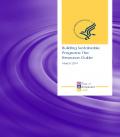The role of community in schools consists of the connections between schools and individuals, businesses, and formal and informal organizations and institutions that can leverage community resources and assist students in achieving positive outcomes.
The notion that community has an important role in the education of America’s children is long-standing and is a central theme of education reform. Community members partnering on the ground (e.g., neighbors along route to school) can ensure safety and provide support to staff, students, and family members. Community agencies partnering between systems (e.g., child welfare, law enforcement, libraries) offer protective factors that can contribute to student resilience as well as help efficiently and effectively address issues when they arise. Schools that are well connected to the local community can create a safe and supportive environment inside and outside of the classroom.




